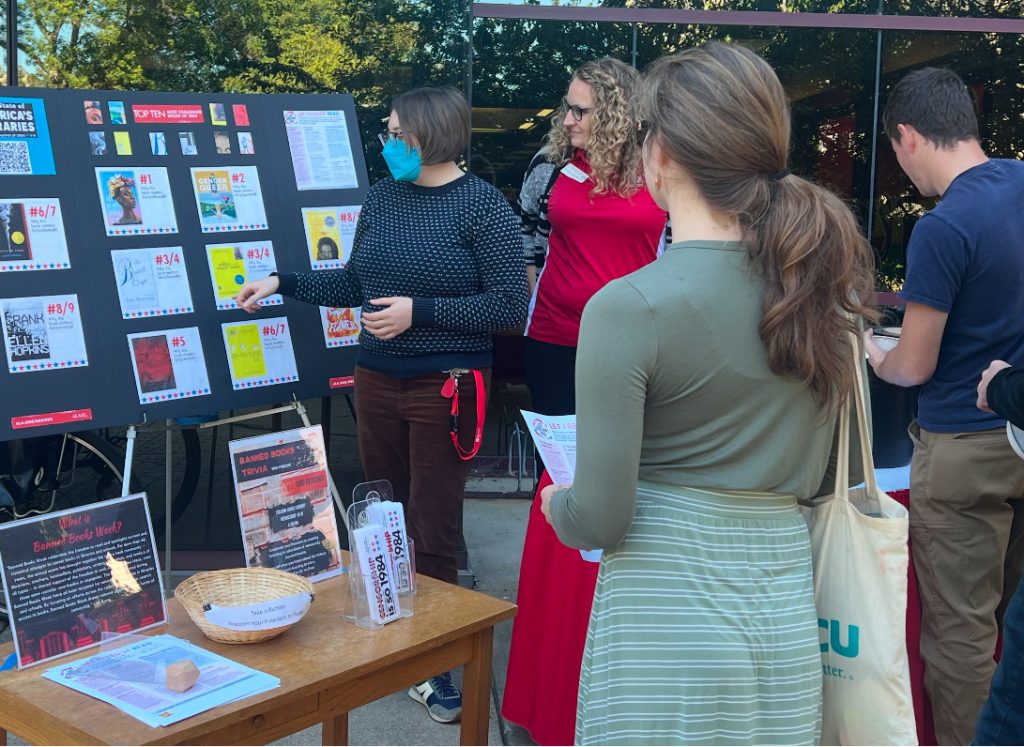
“Censorship is so 1984.”
At least, it should be. This was the message being spread in the Cullom-Davis Library on Oct. 8, where tubs of ice cream and sprinkles of information regarding 2024’s list of banned books were displayed.
The event marked the official book ban week (Oct. 5-11) set by the American Library Association (ALA).
This year’s slogan was inspired by George Orwell’s 1949 novel, “1984,” which narrates a dystopian government that monitors and censors the population for control. Gradually, elements of this fictional work have started to bleed into reality.
In the 2024-25 school year, PEN America recorded 6,870 instances of book bans. ALA’s list of the top ten challenged books this year include popular titles “Looking For Alaska” and “The Perks of Being a Wallflower.”
Reasons for books being challenged vary, but two stand out as the most prevalent.
“A lot of these books are banned because of LGBTQ content and sexual themes,” Holly Johnson, co-chair of the library engagement committee, said.
The reasons for the challenges have remained the same over the years. However, there has been a shift recently.
“We’re down in terms of the number of challenges reported, but we’re up in the number of individual books being reported,” Johnson said. “It means that these books are being targeted by large organizations, not grassroots campaigns of concerned parents or educators. These are lobbying groups that are putting in these challenges.”
The structure and missions of the lobbying groups further explain the trend.
“There’s been an increasing focus on the same young adult books, because more groups have become more organized in our current political climate,” Christina Norton, the online learning librarian, said. “There’s a group called Moms for Liberty that is really going hard on book challenges, and they pick the same ones over and over again.”
As hinted by the group’s name, Moms for Liberty typically targets children’s and young adult books.
“Adults have way more agency and the ability to choose what they read,” Norton said. “Children usually have their parents take them to the library or their school has to choose the book. So, groups like Moms for Liberty will encourage their members to join school boards or target school boards with letter-writing campaigns to intimidate the people providing access to these books to children.”
These attempts to control what others consume have extended beyond the bookshelves.
“We have censorship online now too, and because social media is owned by private companies, they’re not necessarily protected under the First Amendment rights,” Makayla Roller, affiliate instructor at Bradley and professor at ISU, said.
With book challenges and media censorship combined, children’s reading options and the human connections across large distances aren’t the only things in jeopardy.
“Of course, government textbook-wise, we have democracy, but if ideas and experiences are being censored and we don’t have access to understand those experiences, then you don’t have democracy,” Roller said. “You just have a facade.”
Despite the movements around books and media, there are still ways to counteract their censorship.
“[Have] a variety of places to go to for communication. So, yes, you’re using social media, but you’re also using discourse in the real world and consuming traditional media,” Roller said. “I would also say [hold] politicians and the actual platforms accountable.”
Book-banning is not legal in the state of Illinois. However, the event still highlighted the importance of speaking against censorship, regardless of whether the book has a popular message.
“Even a book like Mein Kampf, while it is a sh*tty book, can show us important details about history,” said Norton.
